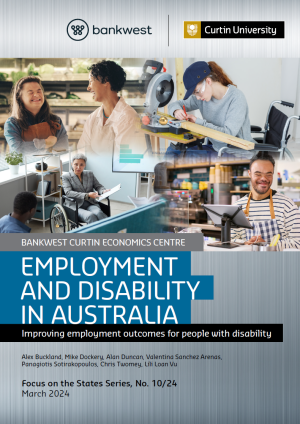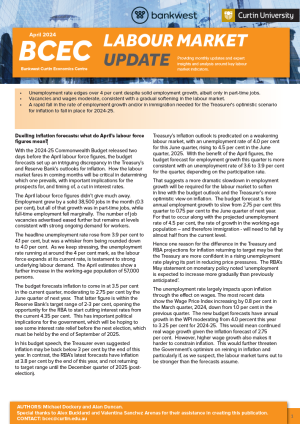Publications
Search results for
Author: Yashar TarverdiX
Trust a few: natural disasters and the formation of trust in Africa
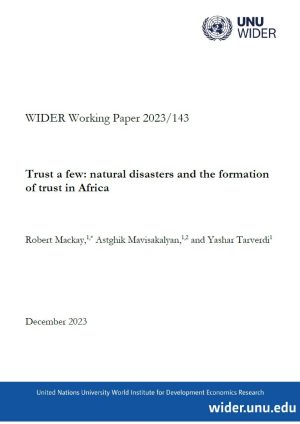 Individuals are at their most mental plasticity in their impressionable years (ages 18–25 years) forming long-term attitudes and behaviours essential to functioning in a society, such as trust. In this paper we ask how exposure to natural disasters within the... Read article
Individuals are at their most mental plasticity in their impressionable years (ages 18–25 years) forming long-term attitudes and behaviours essential to functioning in a society, such as trust. In this paper we ask how exposure to natural disasters within the... Read article
 Individuals are at their most mental plasticity in their impressionable years (ages 18–25 years) forming long-term attitudes and behaviours essential to functioning in a society, such as trust. In this paper we ask how exposure to natural disasters within the... Read article
Individuals are at their most mental plasticity in their impressionable years (ages 18–25 years) forming long-term attitudes and behaviours essential to functioning in a society, such as trust. In this paper we ask how exposure to natural disasters within the... Read article
Identity and support for policies towards Indigenous people: evidence from Australia
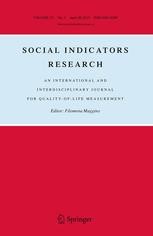 This paper adds to knowledge on the role of politicians’ and voters’ identities in influencing policy-making in societies marked by ethnic inequality. The outcome we investigate is the initiatives and policies targeting Indigenous populations in the context of Australia. We... Read article
This paper adds to knowledge on the role of politicians’ and voters’ identities in influencing policy-making in societies marked by ethnic inequality. The outcome we investigate is the initiatives and policies targeting Indigenous populations in the context of Australia. We... Read article
 This paper adds to knowledge on the role of politicians’ and voters’ identities in influencing policy-making in societies marked by ethnic inequality. The outcome we investigate is the initiatives and policies targeting Indigenous populations in the context of Australia. We... Read article
This paper adds to knowledge on the role of politicians’ and voters’ identities in influencing policy-making in societies marked by ethnic inequality. The outcome we investigate is the initiatives and policies targeting Indigenous populations in the context of Australia. We... Read article
Coping Collectively: Responses to Natural Disasters in Africa
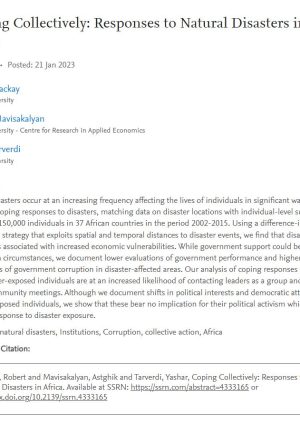 Natural disasters occur at an increasing frequency affecting the lives of individuals in significant ways. We study the coping responses to disasters, matching data on disaster locations with individual-level survey data from over 150,000 individuals in 37 African countries in... Read article
Natural disasters occur at an increasing frequency affecting the lives of individuals in significant ways. We study the coping responses to disasters, matching data on disaster locations with individual-level survey data from over 150,000 individuals in 37 African countries in... Read article
 Natural disasters occur at an increasing frequency affecting the lives of individuals in significant ways. We study the coping responses to disasters, matching data on disaster locations with individual-level survey data from over 150,000 individuals in 37 African countries in... Read article
Natural disasters occur at an increasing frequency affecting the lives of individuals in significant ways. We study the coping responses to disasters, matching data on disaster locations with individual-level survey data from over 150,000 individuals in 37 African countries in... Read article
Identity and support for policies towards Indigenous people
 This paper adds to knowledge on the role of politicians’ and voters’ identities in influencing policy-making in societies marked by ethnic inequality. The outcome we investigate is the initiatives and policies targeting Indigenous populations in the context of Australia. We... Read article
This paper adds to knowledge on the role of politicians’ and voters’ identities in influencing policy-making in societies marked by ethnic inequality. The outcome we investigate is the initiatives and policies targeting Indigenous populations in the context of Australia. We... Read article
 This paper adds to knowledge on the role of politicians’ and voters’ identities in influencing policy-making in societies marked by ethnic inequality. The outcome we investigate is the initiatives and policies targeting Indigenous populations in the context of Australia. We... Read article
This paper adds to knowledge on the role of politicians’ and voters’ identities in influencing policy-making in societies marked by ethnic inequality. The outcome we investigate is the initiatives and policies targeting Indigenous populations in the context of Australia. We... Read article
Heaven can wait: future tense and religiosity
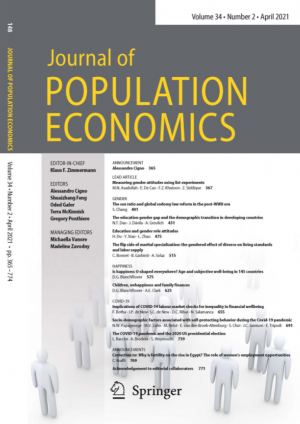 This paper identifies a new source of differences in religiosity: the type of future tense marking in language. We argue that the rewards and punishments that incentivise religious behaviour are more effective for speakers of languages without inflectional future tense.... Read article
This paper identifies a new source of differences in religiosity: the type of future tense marking in language. We argue that the rewards and punishments that incentivise religious behaviour are more effective for speakers of languages without inflectional future tense.... Read article
 This paper identifies a new source of differences in religiosity: the type of future tense marking in language. We argue that the rewards and punishments that incentivise religious behaviour are more effective for speakers of languages without inflectional future tense.... Read article
This paper identifies a new source of differences in religiosity: the type of future tense marking in language. We argue that the rewards and punishments that incentivise religious behaviour are more effective for speakers of languages without inflectional future tense.... Read article
Measuring governance: Why do errors matter?
 The Worldwide Governance Indicators (WGI) are well-known proxies for institutions and are widely used in many studies across different disciplines. Each of the six WGI is constructed by aggregating several baseline indicators that reflect information about a single latent variable.... Read article
The Worldwide Governance Indicators (WGI) are well-known proxies for institutions and are widely used in many studies across different disciplines. Each of the six WGI is constructed by aggregating several baseline indicators that reflect information about a single latent variable.... Read article
 The Worldwide Governance Indicators (WGI) are well-known proxies for institutions and are widely used in many studies across different disciplines. Each of the six WGI is constructed by aggregating several baseline indicators that reflect information about a single latent variable.... Read article
The Worldwide Governance Indicators (WGI) are well-known proxies for institutions and are widely used in many studies across different disciplines. Each of the six WGI is constructed by aggregating several baseline indicators that reflect information about a single latent variable.... Read article
Environmental Policy: An Economic Perspective
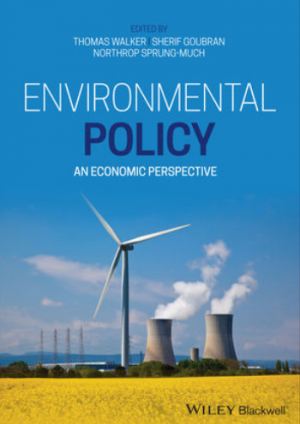 Chapter 2 Responses to Climate Change Worldwide: Individual Preferences and Policy Actions around the World This chapter provides a comprehensive overview of climate change policies and actions around the world. At the level of countries, we document the differences in... Read article
Chapter 2 Responses to Climate Change Worldwide: Individual Preferences and Policy Actions around the World This chapter provides a comprehensive overview of climate change policies and actions around the world. At the level of countries, we document the differences in... Read article
 Chapter 2 Responses to Climate Change Worldwide: Individual Preferences and Policy Actions around the World This chapter provides a comprehensive overview of climate change policies and actions around the world. At the level of countries, we document the differences in... Read article
Chapter 2 Responses to Climate Change Worldwide: Individual Preferences and Policy Actions around the World This chapter provides a comprehensive overview of climate change policies and actions around the world. At the level of countries, we document the differences in... Read article
Paradise Postponed: Future Tense and Religiosity
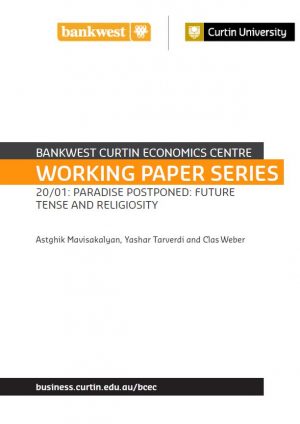 This paper identifies a new source of differences in religiosity: the presence of future tense marking in language. We argue that the rewards and punishments that incentivise religious behaviour are less effective for speakers of languages that contain future tense... Read article
This paper identifies a new source of differences in religiosity: the presence of future tense marking in language. We argue that the rewards and punishments that incentivise religious behaviour are less effective for speakers of languages that contain future tense... Read article
 This paper identifies a new source of differences in religiosity: the presence of future tense marking in language. We argue that the rewards and punishments that incentivise religious behaviour are less effective for speakers of languages that contain future tense... Read article
This paper identifies a new source of differences in religiosity: the presence of future tense marking in language. We argue that the rewards and punishments that incentivise religious behaviour are less effective for speakers of languages that contain future tense... Read article
Governance, democracy and development
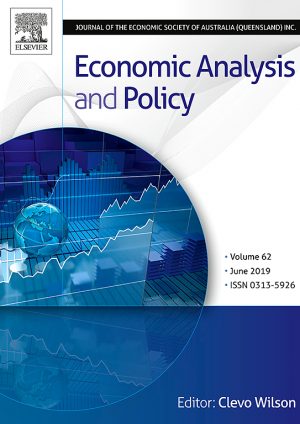 While it is obvious that the level of democracy will affect the quality of governance, we show that an electoral democracy should not be expected to have an improved level of governance when compared with an outright authoritarian regime. We... Read article
While it is obvious that the level of democracy will affect the quality of governance, we show that an electoral democracy should not be expected to have an improved level of governance when compared with an outright authoritarian regime. We... Read article
 While it is obvious that the level of democracy will affect the quality of governance, we show that an electoral democracy should not be expected to have an improved level of governance when compared with an outright authoritarian regime. We... Read article
While it is obvious that the level of democracy will affect the quality of governance, we show that an electoral democracy should not be expected to have an improved level of governance when compared with an outright authoritarian regime. We... Read article
BCEC Monthly Labour Market Update – February 2019
 Welcome to the February 2019 edition of the BCEC Monthly Labour Market Update. Produced monthly, this economic commentary explores the latest labour force data released by the Australian Bureau of Statistics (ABS), providing expert insights and analysis around key labour market indicators. We’ve also... Read article
Welcome to the February 2019 edition of the BCEC Monthly Labour Market Update. Produced monthly, this economic commentary explores the latest labour force data released by the Australian Bureau of Statistics (ABS), providing expert insights and analysis around key labour market indicators. We’ve also... Read article
 Welcome to the February 2019 edition of the BCEC Monthly Labour Market Update. Produced monthly, this economic commentary explores the latest labour force data released by the Australian Bureau of Statistics (ABS), providing expert insights and analysis around key labour market indicators. We’ve also... Read article
Welcome to the February 2019 edition of the BCEC Monthly Labour Market Update. Produced monthly, this economic commentary explores the latest labour force data released by the Australian Bureau of Statistics (ABS), providing expert insights and analysis around key labour market indicators. We’ve also... Read article
BCEC Monthly Labour Market Update – January 2019
 Welcome to the January 2019 edition of the BCEC Monthly Labour Market Update. Produced monthly, this economic commentary explores the latest labour force data released by the Australian Bureau of Statistics (ABS), providing expert insights and analysis around key labour market indicators. We’ve... Read article
Welcome to the January 2019 edition of the BCEC Monthly Labour Market Update. Produced monthly, this economic commentary explores the latest labour force data released by the Australian Bureau of Statistics (ABS), providing expert insights and analysis around key labour market indicators. We’ve... Read article
 Welcome to the January 2019 edition of the BCEC Monthly Labour Market Update. Produced monthly, this economic commentary explores the latest labour force data released by the Australian Bureau of Statistics (ABS), providing expert insights and analysis around key labour market indicators. We’ve... Read article
Welcome to the January 2019 edition of the BCEC Monthly Labour Market Update. Produced monthly, this economic commentary explores the latest labour force data released by the Australian Bureau of Statistics (ABS), providing expert insights and analysis around key labour market indicators. We’ve... Read article
Self-assessed versus statistical evidence of racial discrimination: The case of Indigenous Australians
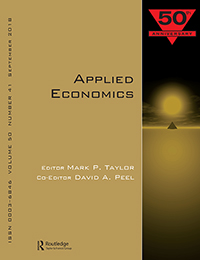 This paper provides new insights on the labour market discrimination faced by Indigenous Australians – one of the most disadvantaged indigenous populations in developed countries. Combining two large, nationally-representative datasets, we decompose the employment gap between indigenous and non-indigenous populations... Read article
This paper provides new insights on the labour market discrimination faced by Indigenous Australians – one of the most disadvantaged indigenous populations in developed countries. Combining two large, nationally-representative datasets, we decompose the employment gap between indigenous and non-indigenous populations... Read article
 This paper provides new insights on the labour market discrimination faced by Indigenous Australians – one of the most disadvantaged indigenous populations in developed countries. Combining two large, nationally-representative datasets, we decompose the employment gap between indigenous and non-indigenous populations... Read article
This paper provides new insights on the labour market discrimination faced by Indigenous Australians – one of the most disadvantaged indigenous populations in developed countries. Combining two large, nationally-representative datasets, we decompose the employment gap between indigenous and non-indigenous populations... Read article

